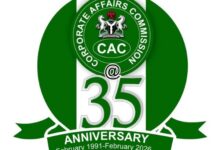DBN, BOI, PENCOM top 2022 integrity index ranking for MDAs
 The Development Bank of Nigeria (DBN), Bank of Industry (BOI), and National Pension Commission (PENCOM) have emerged as the top three organisations in the 2022 Transparency and Integrity Index ranking for Ministries, Departments and Agencies (MDAs).
The Development Bank of Nigeria (DBN), Bank of Industry (BOI), and National Pension Commission (PENCOM) have emerged as the top three organisations in the 2022 Transparency and Integrity Index ranking for Ministries, Departments and Agencies (MDAs).
The News Agency of Nigeria (NAN) reports that the DBN came top of the ranking with 58.74 points, while BOI and PENCOM scored 48.33 each, to finish second and third respectively.
The Nigerian Extractive Industries Transparency Initiative (NEITI), Bureau of Public Service Reforms, Bureau of Public Procurement, Debt Management Office, ICPC and Nigeria Sovereign Investment Authority were among the top 10.
The ranking was carried out by the Centre for Fiscal Transparency and Integrity Watch (CeFTIW), supported by MacArthur Foundation.
The Executive Director of CeFTIW, Mr Umar Yakubu said at the 511 MDAs were assessed, across six broad variables.
Yakubu said the ranking was aimed at preventing corruption in public office as it centred on procurement, budget, human resources, inclusion and website integrity.
“We used this to check the level of transparency with regards to public finances especially in procurement, how the MDAs spend their money, generate taxes, recruit people; it also assesses them generally on efficiency.
“It is on this assessment that we brought out the ranking of 511 institutions which you saw where some did well and some did not do well.
“We want MDAs to do well. We hope they will engage Nigerians more on their websites, and it is a way of preventing corruption,” he said.
Yakubu regretted that most MDAs chose to present information on their citizen- engagement but decline information on procurement which turned out to be where the corruption centered more.
He also frowned at the non availability of information on federal character from the MDAs to enable Nigerians know states representation in the various public offices.
“Those are the things missing, but citizens engagement, social media relationship are very active but our aim is for the MDAs to give information on procurement and publish their audited report.
“Highest score last year was 31 per cent, while this year is over 50 per cent, so it is a sign that things will get better.”
He said that the centre had already involved the EFCC, ICPC and Code of Conduct Bureau to compel defaulting MDAs to give information on procurement and things concerning their finances.
The Secretary to Government of the Federation (SGF), Mr Boss Mustapha said the federal government had stepped-up measures to strengthen external audit scrutiny in the management of public funds.
Mustapha, represented by Mr Nnamdi Mbaeri, Permanent Secretary, General Services, office of the SGF, said the measures would be achieved through the introduction of the Open Treasury Portal, for full disclosure of payments.
Mr Dasuki Arabia, Director General, Bureau of Public Service Reforms said transparency and accountability were critical in ensuring that resource were properly managed for the benefit of all.
Arabia said the need for prudence and transparency in government were informed by the economic vulnerability caused by the dip in oil prices across the world, and the wide perception of Nigeria been regarded as a nation bedeviled with high rate of corruption.
“Prudent public finance management have become imperative as government continues to face significant fiscal constraints, with expenditures rising much faster than revenues, resulting in rising budget deficits and borrowings.
“Accordingly, the unveiling of the Probe Monitor Portal and the Public Service Diary Application is a laudable step towards creating reservoir of knowledge for judicial processes.
“It will also strengthen track records of Public Servants towards mentorship and promoting core ethical values within Public Institutions,” Arabia said.
He noted that wake of the Post-COVID and its attendant consequences as well as global trend of economic recession had made it imperative for nations to review their economic policies.
Arabia also noted that nations were now fashioning out new Public Financial Management models towards economic growth and development.











